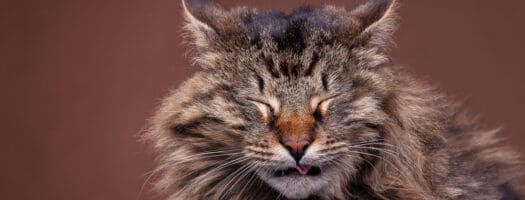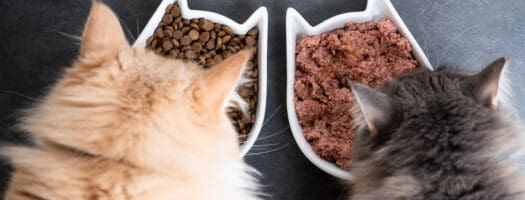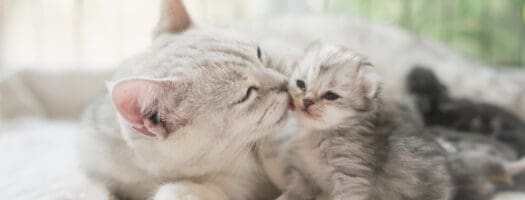How to Calm Down Your Hyper Cat
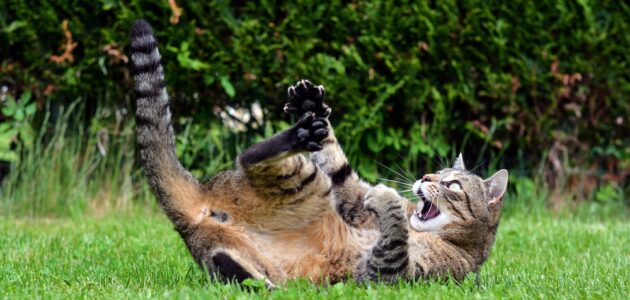
Many cat owners have experienced their feline friend waking up from a nap and suddenly moving to full speed as they race through the house, occasionally accompanied with meowing battle cries. This type of hyperactivity is generally normal and just part of cats being cats, but what about when your kitty refuses to calm down or spends a significant amount of time acting hyper?
It can be stressful dealing with a hyperactive cat that always seems to be in a reactive, crazy mood. There are several methods you can try to calm down your hyper cat, but you should also understand the source behind your kitty’s hyperactivity, in order to be fully prepared to treat the issue.
What Causes Cat Hyperactivity?
In nature, cats spend most of their day laying around, relaxing and napping, much like your kitty at home. However, in the wild, these long periods of rest are punctuated by brief moments of extreme energy and activity while the cat hunts prey. Cats have an ingrained, biological function that drives them to conserve energy and then expend it very quickly during the hunting process; without this prey drive, cats would not survive in the wild, as they would not be driven to eat.
Your cat at home still experiences this drive, even though they are no longer living in the wild or have a need to hunt. This is what results in their occasional hyper behavior, including running, jumping, meowing, attacking toys or feet, and chasing other inhabitants of their home. As soon as their energy is spent, they will continue acting as if nothing happened, and will probably lay back down for a nap.
Hyperactive behavior is increased when your cat spends all day alone, does not have dedicated play times, or does not have enough toys to relieve their boredom.
Why Is My Cat Crazier at Certain Times of the Day?
You may have noticed that your cat only exhibits this behavior at certain times of the day, such as late at night or early in the morning. Many cat owners notice their cat become more hyperactive around the early hours of the morning, between 2 and 3am. This reason for this is the fact that cats are crepuscular, meaning that they are most active during twilight and dawn hours, with occasional nighttime hyperactivity thrown in.
Your cat may also be exhibiting extra hyper behaviors around meal times. This relates to what we discussed above, with your cat feeling a need to hunt and expend their energy. Naturally, they will feel this drive before or after eating food, which can result in dinner or breakfast time “zoomies.”
When Is Hyperactivity Considered Unhealthy?
Extreme or prolonged periods of hyperactivity can be the result of stress, anxiety, or a medical condition, such as hyperthyroidism. If you notice that your cat has suddenly started becoming extra hyper when they don’t usually experience drawn out periods of hyperactivity, you may need to consult a vet.
If this hyper behavior is accompanied by either an increased or decreased appetite, weight loss, hair loss, or a lack of grooming, there is likely a medical issue at play and you should take your cat into a vet for an exam as soon as possible.
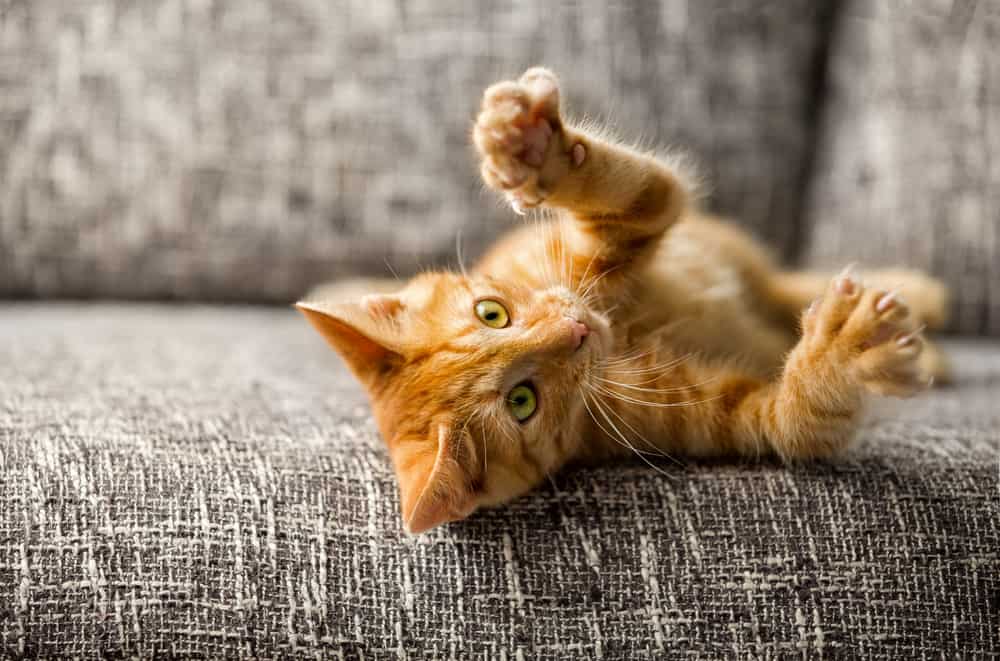
The Best Ways to Calm Down Your Hyper Cat
There are many different ways to brings some Zen into your cat’s life. You can incorporate one or all of these suggestions into your daily routine to help calm down your cat.
More Play Time
Increasing the amount of dedicated playtime you give your cat is one of the best ways to calm down hyperactive behavior. Most of the time, your cat will be hyper as a result of pent-up energy or boredom; spending at least 20 to 30 minutes a day playing with them will help release that energy and decrease instances of hyper behavior.
Daily Enrichment
It is very likely that your cat will be spending long amounts of time at home by themselves, especially if you work a job that requires you to be out of the house all day. This can result in long periods of inactivity and boredom for your cat, that will in turn cause them to experience extreme hyperactivity once you are at home.
Filling your home with interactive toys, scratching posts, and places where your cat can sit and get a good view is a great way to enrich your cat’s day to day life and allow them to work some of their energy out during the day, resulting in a much calmer cat for you to play with when you come home.
Adopt a Friend
Introducing another cat into your household is a good way to provide your resident kitty with a companion that they can spend their time with and play with on a regular basis. Doing this can decrease random bursts of hyperactive behavior cause by boredom or loneliness and can make both of your adopted cats happier in the long run. Just make sure that you take proper precautions when introducing your cats to avoid any negative interactions.
Work Towards Household Harmony
Extra stress in your household, whether it be from too many humans coming in and out or a rivalry between other animals in the home, can cause your kitty to act out with hyperactive behavior.
Make sure that your cat has plenty of safe spaces they can retreat to when feeling overwhelmed and that relations between all the animals in your home are peaceful. You can do this by monitoring your cat’s interactions with your other pets to ensure there is no intimidation occurring or fights breaking out.
Relaxing Pheromones
For help encouraging your cat to stay calm throughout the day or in certain stressful situations, you can spray areas in your home with relaxing pheromones. These sprays are designed to inspire a sense of calm in your cat and can help curb excessive hyperactivity.
However, it is important to note that you shouldn’t be using these pheromone sprays as a way to encourage inactivity in your cat or as a way to get out of playing with your cat. Your cat will still need toys and exercise, but the spray can help them stay calm and stress-free throughout the day.
Organize Supervised Outside Time
If you are fortunate enough to live somewhere with access to the outdoors or a garden, consider organizing some supervised outside time for your cat. This can help enrich their daily routine and exercise both their minds and their body while they explore the outdoors.
Outside time can be created in a number of ways – you can build an outdoor catio for your kitties to lounge in, you can make sure your garden is completely enclosed and watch your kitty while they play outside, or you could train your cat to walk on a leash, further expanding the areas you can visit with them. All of these options are perfect for decreasing the hyperactivity of your cat, because they will be exhausted once they return from playtime outside!
Ensure They Are Cared For
Sometimes, your cat engages in hyperactive behavior because they are trying to demonstrate their dislike of something in their environment. This is typically a result of a stressor in their life and it could be something as simple as a litter box that is too dirty, or it could be a more complex issue, like your cat being too overweight or not able to groom themselves.
Take a look at your cat’s surroundings and frequently visited areas to ensure that your cat is well-cared for and nothing has changed. This means making sure the litter box is cleaned regularly. Once a day is best, or you can get a self-cleaning litter box. Also ensure that your cat is at a healthy weight, and that there are no underlying medical conditions that your kitty may be experiencing.
Avoid Free-Feeding
Cats will typically experience bouts of hyperactive behavior before or after eating. This is an ingrained behavior that mimics how they would act in the wild. If you free-feed your cat, the odds are that they will eat whenever they want during the day, causing their hyperactivity to randomly appear at strange, possibly inconvenient times.
To help calm down and curb this behavior, you should feed your cat on a specific schedule, with their last meal being no later than a couple hours before you go to bed. This way, you will be free to play with your cat during their hyperactive periods before or after meals and can help tire them out, so your night times and mornings aren’t filled with the sound of running paws and wild meows.
If you can’t be around to feed your cat every meal on a schedule, you could also consider investing in an interactive feeder that requires your cat to figure out how to receive their food. This will stimulate their mind and help them eat slower, resulting in less hyperactivity before or after they eat.
Consider Visiting the Vet
If your cat is especially hyper, and they aren’t exhibiting any of the typical signs of a medical condition, you still may want to consider taking them to a vet. Anxiety and stress can be common issues in cats that causes them to act hyper; if your cat is not responding to any of the other techniques to calm them, then they may need to be evaluated by a vet for an underlying medical condition and possibly put on medication designed to help them mellow out.
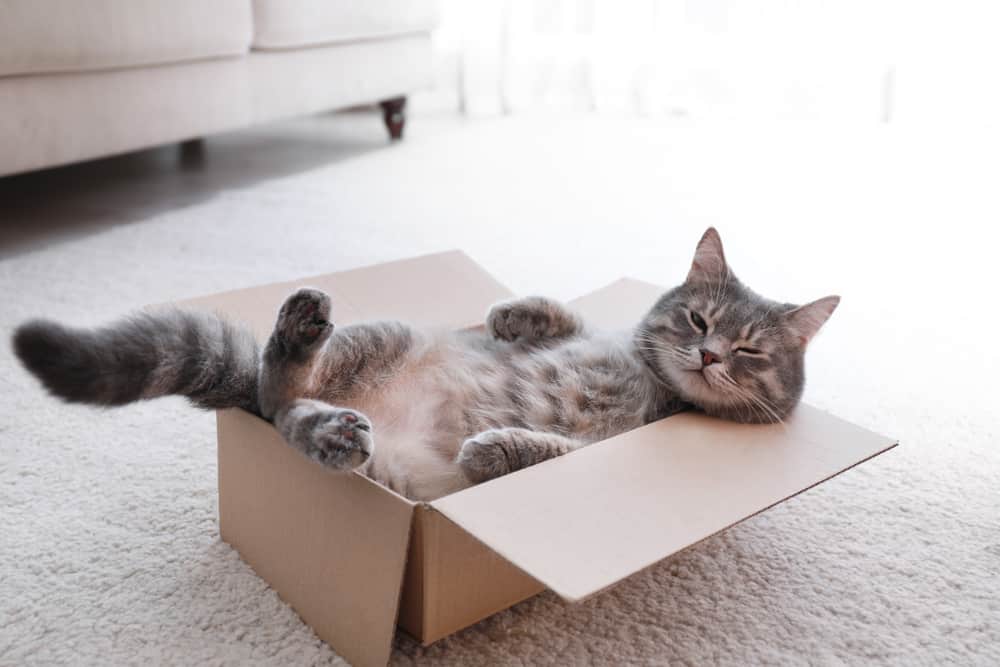
Encouraging Calm in Your Cat
While a certain amount of craziness is expected to appear in your cat from time to time, if your furry friend is constantly hanging from the rafters, it might be time to introduce some calming strategies into their life. Whether you decide to dedicate extra time playing with your kitty, adopt another cat to keep them company, or invest in mentally stimulating toys, you should always remember to give your cat lots of love and spend time quality time with them, encouraging calm.

